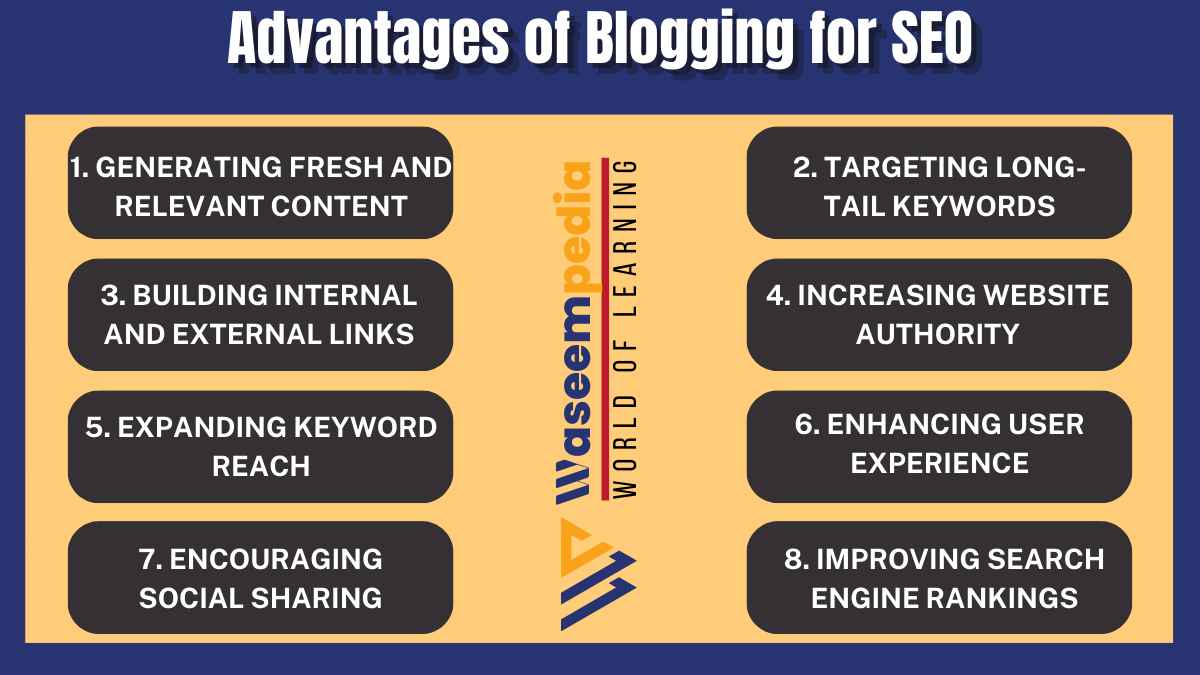Blogging offers several advantages for SEO, making it a valuable strategy for websites looking to improve their search engine rankings and attract organic traffic. By consistently producing fresh and relevant content, targeting long-tail keywords, building links, enhancing user experience, and expanding keyword reach, websites can optimize their SEO efforts and achieve long-term success in the digital landscape.

In the realm of digital marketing, search engine optimization (SEO) plays a crucial role in improving a website’s visibility and attracting organic traffic. While there are various strategies to enhance SEO, blogging has proven to be a powerful tool with numerous advantages. In this article, we will explore the key benefits of blogging for SEO purposes.
What is SEO and Blogging?
SEO refers to the practice of optimizing a website to rank higher in search engine results pages (SERPs). It involves various techniques to enhance visibility, attract organic traffic, and improve the overall user experience. Blogging, on the other hand, involves regularly publishing informative and engaging articles on a website’s blog section. Now, let’s delve into the advantages of blogging for SEO.
10 Advantages of Blogging for SEO
There are many advantages of Blogging and SEO Blogging but here we will discuss 10 Advantages of Blogging for SEO that are as followng.
1. Generating Fresh and Relevant Content
Blogging allows websites to consistently produce fresh and relevant content. Search engines prioritize websites that frequently update their content, as it indicates relevance and reliability. By publishing blog posts regularly, websites provide search engines with new material to index, which can positively impact their search rankings.
2. Targeting Long-Tail Keywords
Long-tail keywords are specific and highly targeted search terms that users use to find specific information. Blogging provides an opportunity to naturally incorporate long-tail keywords into the content. By identifying relevant long-tail keywords and strategically integrating them into blog posts, websites can attract more targeted traffic and improve their chances of ranking higher for those specific search queries.
3. Building Internal and External Links
Blogging facilitates the creation of internal and external links, both of which are essential for SEO. Internal linking involves linking to other pages within the website, which helps search engines discover and crawl different pages more effectively. External linking involves referencing authoritative sources and credible websites, which can improve the website’s credibility and search engine rankings.
4. Increasing Website Authority
One of primary Advantages of Blogging for SEO is Increasing website Authority. Search engines consider the authority and credibility of a website when determining its ranking. Blogging allows websites to demonstrate their expertise and knowledge in a particular niche, thereby increasing their authority. By consistently producing valuable and informative content, websites can attract more visitors, gain their trust, and enhance their overall authority in the eyes of search engines.
5. Expanding Keyword Reach
Blogging provides an opportunity to target a broader range of keywords related to the website’s industry or niche. Each blog post can focus on a specific keyword or topic, allowing websites to cover a wider spectrum of relevant search queries. By expanding the keyword reach, websites increase their chances of attracting diverse organic traffic and ranking for various keywords.
6. Enhancing User Experience
User experience is a crucial factor in SEO. Websites that provide a positive user experience tend to rank higher in search engine results. Blogging contributes to a better user experience by offering valuable and engaging content that meets the needs of the target audience. When visitors find informative and helpful blog posts, they are more likely to stay longer on the website, explore other pages, and potentially convert into customers.
7. Encouraging Social Sharing
Blogging plays a significant role in social media marketing and can contribute to the amplification of content through social sharing. When websites publish valuable blog posts, readers are more likely to share them on social media platforms, increasing the visibility and reach of the content. Social sharing not only drives more traffic but also improves the website’s authority and credibility in the eyes of search engines.
8. Attracting Natural Backlinks
High-quality backlinks from other reputable websites are valuable assets in SEO. Blogging creates opportunities for websites to attract natural backlinks. When websites produce valuable and insightful content, other websites or bloggers may link to their blog posts as references or resources. These natural backlinks signal to search engines that the website is trusted and authoritative, leading to improved search engine rankings.
9. Boosting Organic Traffic
One of the primary goals of SEO is to increase organic (non-paid) traffic to a website. Blogging contributes to this goal by attracting more visitors through organic search results. When websites consistently publish valuable and optimized blog posts, they increase the chances of appearing in search engine results for relevant queries, driving organic traffic to the website.
10. Improving Search Engine Rankings
Ultimately, the overarching advantage of blogging for SEO is the potential to improve search engine rankings. By following best practices such as producing high-quality content, targeting relevant keywords, building links, and enhancing user experience, websites can enhance their SEO efforts. Over time, this can lead to higher search engine rankings, increased visibility, and more organic traffic. So, Improving Search engine Ranking Advantages of Blogging for SEO.
Related FAQ’s
What are the advantages of blogging?
The advantages of blogging include:
Expression: A platform to express thoughts and ideas.
Connectivity: Building a community and connecting with like-minded people.
Visibility: Increasing online visibility and personal branding.
Knowledge: Continuous learning and research.
Monetization: Potential for income through ads or affiliate marketing.
Portfolio: Showcasing expertise and skills.
SEO: Improving website’s search engine rankings.
Networking: Building relationships with industry peers.
Creativity: A creative outlet for writers and content creators.
Feedback: Receiving feedback and engaging with an audience.
Do blogs need SEO?
Yes, blogs benefit from SEO (Search Engine Optimization) to improve visibility and reach a wider audience.
Why is SEO important for business blogs?
SEO is important for business blogs because it helps increase organic traffic, attract potential customers, and improve the blog’s visibility in search engine results, ultimately contributing to business growth and success.
What is SEO blog writing?
SEO blog writing is the practice of creating blog content that is optimized for search engines. It involves using relevant keywords, high-quality content, and other SEO techniques to improve a blog’s visibility and ranking in search engine results pages (SERPs).
How do I use SEO keywords in my blog?
To use SEO keywords in your blog:
Research: Identify relevant keywords related to your topic.
Placement: Incorporate keywords naturally in the title, headings, and throughout the content.
Variation: Use synonyms and related terms to avoid keyword stuffing.
Meta Tags: Include keywords in meta titles and descriptions.
URL: Use keywords in the blog post’s URL.
Image Alt Text: Add descriptive keywords to image alt text.
User Intent: Ensure content aligns with user intent for the chosen keywords.
Quality Content: Focus on providing valuable, informative content.
Analytics: Monitor performance and adjust keyword usage as needed.

